Frontrunners of Medical Innovation V
July. 08, 2013
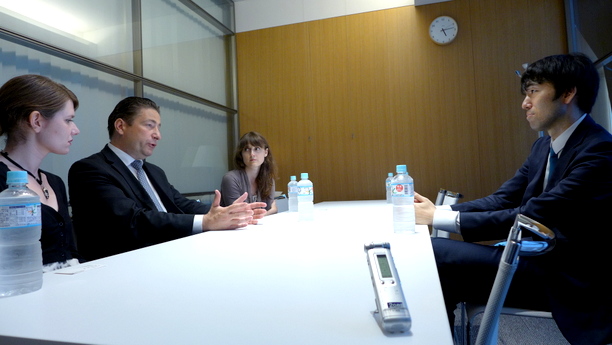
Sato Thanks very much for coming to the University of Tokyo, especially to Policy Alternative Research Institute. My name is Chiaki Sato. I'm an assistant professor at the graduate school of public policy, University of Tokyo. We want to have interviews about the information use and privacy protections. Today, we have three guests from Hannover; first is Professor Forgó, Magdalena and Stefanie.
We have three questions or the points. First one is about your purpose to come to Japan. Second one is about EU's revision on data protection and third is about your honorable institution's research.
Shall we start from the first question. I know that you went to Osaka for attending a conference related with personalized medicines. Please explain about your presentation for coming to Osaka.
Forgó Thank you very much, Mr. Sato for having the time and being so gracious to invite us here to have a meeting together with you. It's really great pleasure to be here. We are very, very impressed by the University of Tokyo and its beautiful campus. Everything is really, really nice here. So, thank you for having us here.
The reason why we went to Osaka is that there was a huge conference about bioinformatics and bioengineering and medical informatics. There was a special session there on personalized medicine that was organized by one of the projects we are very heavily involved in, which is called p-medicine, personalized medicine.
That's a European project funded by the European Commission, and we gave a presentation in this workshop and we also had a second presentation on personalized medicine in one of the more general branches of the conference.
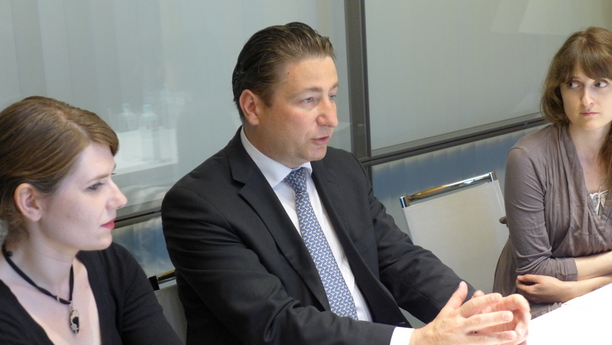
We spoke about two projects here; p-medicine on the one side, and Eureca on the other side, both European projects which have the common goal, which is using ICT technologies to make it easier for doctors to transfer the borderline between treatment and research, that's one goal; and on the other side, to make it easier for patients to take care of their own medical needs. That's probably the second goal.
Our role there was to talk about privacy-related issues that might rise out of this. And we then decided that we would also like to strengthen the contacts with you, if that would be possible, because you were so nice to be in Hannover last year. And as far as I see, there are very many similar questions in Japan that are also at stake at the moment in Europe when it comes to ICT and health. Therefore it's of utmost importance for us to compare what is happening in Europe and other areas of the world, and it would be very much appreciated to have this possibility.
Sato It sounds great. To tell you the truth, in June, the Japanese government published the Japan Rebirth Strategies. That is the growth strategy for Japan. It includes, for sure, the personalized medicine issues, especially the ICT use for better medical cares. But that is a very broad vision and not so clear content. So we need to know what kind of activities for promoting the personalized medicine in EU and the US side. That is one of our concerns, that we have no concrete programs for promoting the personalized medicine, but we have a very broad vision how we approach the personalized medicine. You tell me that one side is the practitioner side, the other side is patient side, in other words, access to information for better healthcare. That's very, very interesting for me.
Forgó Thank you.
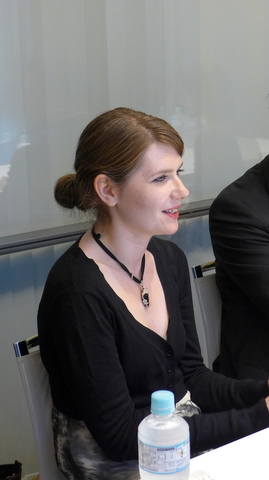
Magdalena I think it was extremely interesting event but firstly, one more time, big thank you for being here.
As to EMBC, it was a very, very interesting conference because it gave us as lawyers the chance to actually see all the newest development, what are engineers doing, so this is definitely something which we can learn. And I think as a consequence, maybe also recognize what is the future, and what could be eventual legal problems for the future. So this is definitely interesting.
Of course, for us, it is also our role there as to try to explain them their legal dangers or legal problems which may follow from their work. For me, this was what the presentation I gave was about. It was exactly the consequences with the sharing, and trying to explain people the difference between sharing what would be personal data and what would be non-personal data, which is of course, in European Union, I think what's the core problems currently, one of that is the protection because the data protection offers this zero-one approach, so although you'll fully fall into the data protection law when you process personal data or although you are out of the scope when you don't.
So we tried to advertise our institutional approach in which we try to propose a framework in which we avoid at any cost processing personal data and process only data in anonymous form, which requires some efforts, but for that, for one point of view, it offers the researcher a little more freedom, and from the other, protects privacy of the patients in our opinion on a higher level.
So this is what I concentrated mostly on, and I think my colleague Stefanie focused more the other side which Nikolaus already mentioned before.
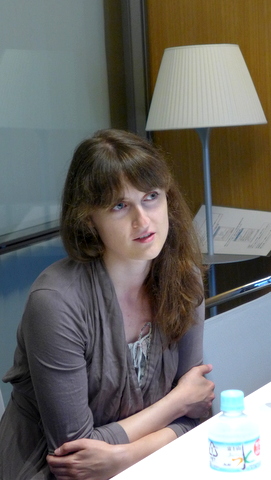
Stefanie I had a presentation and general session, and it was about patient involvements or how to strengthen the roles of patients in clinical trials. We consider it very important to let the patient actively part in the clinical trial, to give them more control over the data and samples. And we actually have interactive empowerment service in p-medicine that is currently under development. I introduced there to medical people and they are very interested.
Sato Really great. I think that both problems are the very issues which are studied to discuss under the Japan Rebirth Strategies. As to the personal data or the non-personal data, that is really through de-identification. We have continuously discussed about it, but there is no formal scheme to de-identify, so I want to know more and more about your researches.
The second issue is about clinical trials. We need to ask the patients safely, "please join in the clinical trials", but it is very difficult how to secure the freedom to join in the clinical trials.
And probably the data sharing or about the data information to the patient is one big issue for securing the patients' involvement to the clinical trials. So I want to know as well about your research too. That is, first, my question.
And the second question is about the EU discussions about, from the directive to her possible regulation about the data protection and data use. What do you think about the present discussions after we met in Hannover?
Forgó Three questions, all three of them very interesting. I would start with the very last one for me, concerning the discussion about the regulation. Most probably know about Europe will be able to tell you what the status is at the moment because it's a very, very complicated situation.
It started more than one and half years ago with the proposal coming from the Commission, which is a normal procedure. And the normal procedure then is that the proposal coming from the Commission is discussed in the Council and then in the Parliament in parallel. And they need to find an agreement, Council and Parliament.
What is outstanding in this case is that the Parliament has so-called 'rapporteur' which is normal, so they have rapporteurs whose role is to translate the Commission's proposal into the Parliamentary discussion so that's the kind of objective reporter. And the outstanding thing that happened was that already the rapporteur for the regulation proposed 350 changes in the Commission's texts. And on top of that, the Parliament, other members of the Parliament, proposed more than 3,300 changes of the texts. So we have a situation where we have a lot of very, very diverse opinions within the Parliament, and at the same time in the Council where the discussion is much less transparent than the Parliament, rumors tell that the discussion is very similar there, that the members of the Council cannot really find the kind of common opinion.
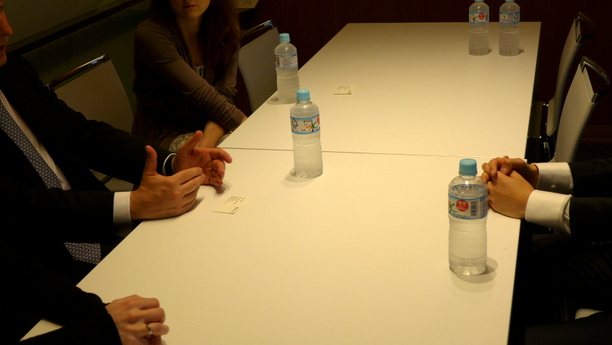
So we have a lot of opinions, many, many, many proposals, and we will have an election of the European Parliament in the close future. And the interesting question now is whether this whole process will come to an end within this period of Parliament, which is, in my personal view, probably not really very realistic to expect any longer. But there are still people who are optimistic and believe that it might still be possible.
Or, in the alternative, the new Parliament which will then be newly elected will need to restart the discussion in 2014, which will then mean that most probably you'll have the regulation somewhere in 2015, which means that it will come into force somewhere in 2016 or 17, a rather far future. So, in optimistic scenario is that still this Parliament will be able to do this. The pessimistic scenario is, we'll need the next Parliament.
And on top of this, apart from this really very complex discussion, we now have this present problem which produces news every day about data that might or might not be transferred to third party countries, which of course also has huge impact on the political discussion on data protection in all 28 member states. It is therefore very hard to say.
And if I may tell about the more specific problems when it comes to medical research, the situation is very much the same there, because in the draft there are two articles which are especially dedicated to data protection issues when it comes to medical treatment and medical research, and both of them are, as the old directive, never relation of such on the very, very heavy discussion. there are many people coming from the clinical and from the research side arguing that already the Commission's text which try to be a compromise in a way, already the Commission text makes it very hard for them to continue with their research, whereas other people, for example the rapporteur, the person reporting for the Parliament, argue that already the Commission violates the basic rights of the patients. So it's very hard to say.
Sato Thank you. In Japan, we have two interesting points for the EU discussion. First one is about right to be Forgótten. The second one is whether EU is thinking to softening the regulation on health information use or not. That is the two big interest points.
As to the second issue, since our meeting in Hannover, there has been for or against discussion and many, many opinions came out so that we, Japanese, cannot understand what is the possible trend for the EU side. In my personal opinion, Japan is waiting for EU's conclusion for our legislation because we used a kind of European model protecting personal information by the universal act though we dually use guidelines by ministries for each sector.
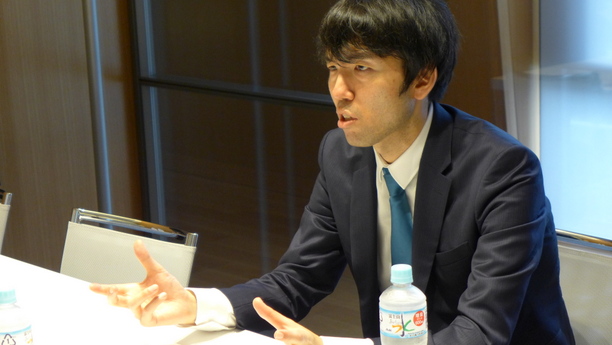
Forgó That will be most interesting thing. And it will also be very interesting because in Europe, one of the concepts that we run at the moment is that we still don't believe or seem not to believe that it is a good idea to have a data protection law which exclusively deals with health data. So we still have this approach which is different from the US approach, that we do not need one specific piece of law taking care of health issues and health research issues.
That is probably one of the reasons why the discussion is so very, very complex because the regulation tries to deal with Facebook and Google and social networks on one side, and relationships between employer and employee on the other side, and at the same time the health and research.
The longer I think about it, the more doubts I have that this is a very sensible approach. I could imagine that if I were not in Europe, one of the questions I would be very much interested in would be whether this US approach distinguishing health data for protection from the rest of data protection issues, or the European approach trying to regulate everything on one umbrella, which of those two has more advantages. It's very hard to say.
Sato It is a very interesting point because before seeing the development of the discussion in EU side, when I met you in Hannover, I thought that sure that EU still keeps the umbrella-type of regulation. But EU regulations, possible regulations, have the specific health information definition. So I thought, at that time, that EU had a little bit different approaches with the US in health information under the umbrella-type of the regulations.
But after the development of the discussions, the trend is going back for more universal type of regulation. That is my impression.
Forgó Yes, and it has a lot to do, for example, with the very basic concept of consent, because one of the questions, of course, at stake is whether patients need to give informed consent when their data is processed for health-related reasons or for research reasons. And when we come to health, then already now, the principle was, no consent is needed. So this is already now in the directive of 1995. When it comes to treatment, no consent needed.
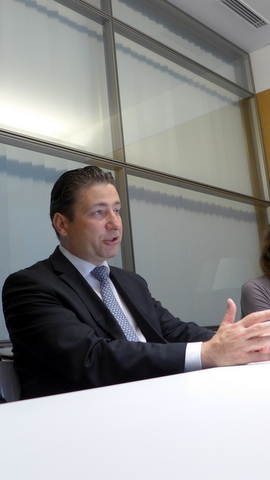
The more the discussion is ongoing, the more there are strong arguments for re-strengthening the informed consent, and therefore one of the questions is whether this movement, if it should be successful, they will have the implications for the treatment area, because if we suddenly had a kind of informed consent necessity for treatment, that would be very different from what we have now.
At the same time, the treatment which is Article 81 and research, Article 83, are two separate articles; all of them having together at this umbrella of very fundamental, basic ideas like informed consent or purpose by new principles or several similar ideas, which probably will make it very hard to handle that. Already on the basis of the proposal of the Commission, I know a lot of medical researchers in Europe who are very concerned about the future of their research if Article 83 should come into force. One of the reasons for this is that Article 83, Section 2 of the draft regulation requires, roughly speaking, informed consent if the data of the patient should be published.
And at the same time, every researcher in Europe faces more and more the situation that journals require them to publish the raw data for quality control reasons, which might lead to the situation that at the same time the researcher is required to publish the raw data, and is not able to do so because he will not find 2000 patient, he would have to ask for consent. And therefore there is a lot of discussion and a lot of fear in this whole arena that the global ideas of the regulation, one of them strengthen the data subject and do this by asking for informed consent wherever it's possible, might lead to a situation where research is getting more of this impossible.
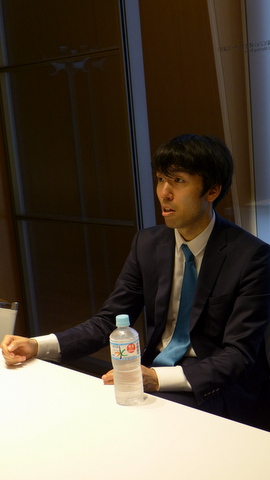
Sato I see. Wow. We have similar issues in Japan, too. I very appreciate your comment. I want to move to the third question about your institute, the research and training for the members. How many people are working there?
Forgó Depends on your count. If you count paid staff, we have about 52 at the moment, 52 people who are paid there.
Sato Not only the health issues but also other technological side, patent or something, are also your topic?
Forgó The approach of the institute is that we deal with everything which has to do with ICT and intellectual property and law. We have the professors. The other one, Professor Metzger is mainly dealing with intellectual property issues. My group mainly deals with information technology and law; within this topics, mainly the privacy and data security and a little bit of consumer protection.
Sato I see.
Forgó In the near future, we will try to focus, again, on data protection and medical research. This is really one of the key areas we are working. The second one is about data protection and surveillance technologies. This is about video cameras and GPS tracking and similar ways of smart surveillance. That's another area.
The third area that is all coming, which has to do with big data, we are involved in several proposals at the moment, some of them already successful which have to do with data protection issues and also intellectual property issues of big data.
Probably something which tries to be an umbrella above all this is about how we need to theoretically re-concept and rethink privacy and personality in the 21st century.
Sato Can I ask Magdalena and Stefanie about why you started or you went to the institution for studying or researching about information law?
Stefanie During my legal traineeship, which is after the first state exam, I had a station with data protection observer, and I found this very, very interesting area, and I had the luck that I was also in medical data protection law area. That's where my interest grew.
Sato How about you, Magdalena?
Magdalena For me, it was always very, very interesting, all those developments of modern society which are actually so much connected with new technologies. It's something very, very interesting from one side, but also something which so much touches in the core, still this question of personality or identity. And it's exactly on the verge of the two which I think somehow the interest lies. It's really the question of "How do you perceive personality today, and how information, the way that the technology develops, influences us as human?" This is the most probably the very farfetched idea behind that I think looking at data protection and being really, like now in this century, because we do amazing things like, for example, we go to a very, very interesting meeting of people in the Commission about the regulation. Such things, just to see how this really develops on the European level, this is something very, very interesting.
And then, it was also something which I very much enjoy that not only do we do this research in the pure sense in an office where you read about these things, but I find this very nice that we actually already work a lot within those European projects, which we do which are funded by the Commission. We really do daily work with people who develop IT law and in medical arena also of the doctors. This gives us a very nice view of what is really happening in the moment.
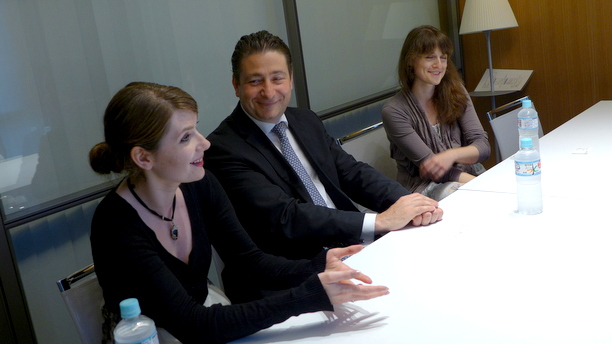
I think the institute where we have the luck of working gives us possibility of balancing both of having a bit of the still this researches for wherever used, maybe in some office or some library, and it's practical work. And as I see now, it also gives us a pleasure to travel and to see people in other cultures and maybe their approaches to the very same issues, which I always find stunning, because at the very end, it's exactly those differences between one or the other approaches bring new ideas and hopefully also develop both sides in some way.
Sato Thank you very much. I have two comments. First one is about the information law is global issue. Information flows all over the world, so how to use the data with proper privacy protection is not only one country's problem but also the other countries' too. I think that to discuss with other country's programs and professors are very interesting. That is one comment.
The other one is that to give nice opportunities for the student or the researchers by getting a grant from the government side or other private side is now very important in Japan. Previously, to get such kind of big grant by law professors is not so frequent, but now not only to get the grant for only research purpose but also to educate the students or researchers by projects is very common, because even the students got knowledge from professors, This is merely theoretic, not any real world approach. We need some training by the projects.
For that, now, University of Tokyo's professors are thinking to get projects for the students to give the opportunity with other country's researchers for giving solution for the societies. So I envy you that you have many projects, and the projects will change you better. I want to learn about your projects to educate the researchers for making a better society. We'll keep in touch.
Anyway, thanks very much indeed for this interview.
(Interviewed by Dr. Chiaki Sato)


